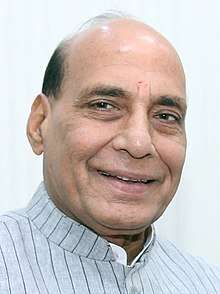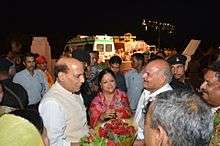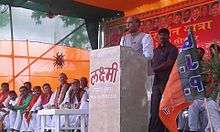Rajnath Singh
| Rajnath Singh राजनाथ सिंह जी | |
|---|---|
 | |
| Minister of Home Affairs | |
|
Assumed office 26 May 2014 | |
| Prime Minister | Narendra Modi |
| Preceded by | Sushilkumar Shinde |
| President of the Bharatiya Janata Party | |
|
In office 23 January 2013 – 8 July 2014 | |
| Preceded by | Nitin Gadkari |
| Succeeded by | Amit Shah |
|
In office 24 December 2005 – 24 December 2009 | |
| Preceded by | L. K. Advani |
| Succeeded by | Nitin Gadkari |
| Minister of Agriculture | |
|
In office 2003–2004 | |
| Prime Minister | Atal Bihari Vajpayee |
| Preceded by | Ajit Singh |
| Succeeded by | Sharad Pawar |
| 19th Chief Minister of Uttar Pradesh | |
|
In office 28 October 2000 – 8 March 2002 | |
| Governor |
Suraj Bhan Vishnu Kant Shastri |
| Preceded by | Nitin pratap singh |
| Succeeded by | President's rule |
| Member of Parliament for Lucknow | |
|
Assumed office 16 May 2014 | |
| Preceded by | Lalji Tandon |
| Member of Parliament for Ghaziabad | |
|
In office 16 May 2009 – 16 May 2014 | |
| Preceded by | Constituency established |
| Succeeded by | Vijay Kumar Singh |
| Personal details | |
| Born |
10 July 1951 Bhabhaura, Uttar Pradesh, India |
| Political party |
|
| Other political affiliations | Bharatiya Jana Sangh (Before 1977) |
| Spouse(s) | Savitri Singh |
| Children | 3 (including Pankaj) |
| Alma mater | Gorakhpur University |
| Website | Official website |
Rajnath Ram Badan Singh (born 10 July 1951) is an Indian politician belonging to the Bharatiya Janata Party (BJP) who currently serves as the Home Minister. He previously served as the Chief Minister of Uttar Pradesh and as a Cabinet Minister in the Vajpayee Government. He has also served as the President of the BJP twice, 2005 to 2009 and 2013 to 2014. He began his career as a physics lecturer and used his long-term association with the Rashtriya Swayamsevak Sangh (RSS) to become involved with the Janata Party.
Early life
Singh was born in the small village of Bhabhaura in Chandauli district, Uttar Pradesh in a Hindu family.[1] His father was Ram Badan Singh and his mother was Gujarati Devi.[2] He was born into a family of farmers and went on to secure a master's degree in physics, acquiring first division results from the Gorakhpur University.[2] Rajnath Singh had been associated with the Rashtriya Swayamsevak Sangh since 1964, at the age of 13 and remained connected with the organisation even during his employment as a physics lecturer in Mirzapur.[2] In 1974, he was appointed secretary for the Mirzapur unit of the Bharatiya Jan Sangh, predecessor of Bhartiya Janta Party.[2] He also worked at PWD as a junior Engineer.
Political career
In 1975, aged 24, Singh was appointed District President of the Jana Sangh.[2] In 1977, he was elected Member of Legislative Assembly from the Mirzapur.[2] He became the State President of the BJP youth wing in 1984, the National general secretary in 1986[2] and the National President in 1988. He was also elected into the Uttar Pradesh legislative council.[2]
In 1991, he became Education Minister in the first BJP government in the state of Uttar Pradesh. Major highlights of his tenure as Education Minister included Anti-Copying Act, 1992, which made copying a non-bailable offence,[3] rewriting history texts and incorporating vedic mathematics into the syllabus.[4] In April 1994, he was elected into the Rajya Sabha (Upper House of the Parliament) and he became involved with the Advisory committee on Industry (1994–96), Consultative Committee for the Ministry of Agriculture, Business Advisory Committee, House Committee and the Committee on Human Resource Development.[2] On 25 March 1997, he became the President of the BJP's unit in Uttar Pradesh and in 1999 he became the Union Cabinet Minister for Surface Transport.[2]

In 2000, he became Chief Minister of Uttar Pradesh and was twice elected as MLA from Haidergarh in 2001 and 2002.[3] He tried to rationalise the reservation structure in government jobs by introducing the most Backward Classes among the OBC and SC, so that the benefit of reservation can reach the lowest status of Society.[5]
In 2003, Singh was appointed as the Minister of Agriculture and subsequently for Food Processing in the NDA Government led by Atal Bihari Vajpayee, and was faced with the difficult task of maintaining one of the most volatile areas of India's economy.[6] During this period he initiated a few epoch-making projects including the Kisan Call Centre and Farm Income Insurance Scheme.[7] He brought down interest rates on Agriculture loans and also established Farmer Commission and initiated Farms Income Insurance Scheme.[5]
After the BJP lost power in the 2004 general elections, it was forced to sit in the Opposition. After the resignation of prominent figure Lal Krishna Advani, and the murder of strategist Pramod Mahajan, Singh sought to rebuild the party by focusing on the most basic Hindutva ideologies.[8] He announced his position of "no compromise" in relation to the building of a Ram Temple in Ayodhya at any cost[8] and commended the rule of Vajpayee as Prime Minister, pointing towards all the developments the NDA made for the ordinary people of India.[9] He also criticised the role of the English language in India, claiming that it caused erosion of cultural values.[10]
He became the BJP National President on December 31, 2005, a post he held till December 19, 2009. In May 2009, he was elected MP from Ghaziabad in Uttar Pradesh.[11]
On 24 January 2013, following the resignation of Nitin Gadkari due to corruption charges, Singh was re-elected as the BJP's National President.[12]
Singh is on record shortly after the law Section 377 of the Indian Penal Code was re-instated in 2013, claiming that his party is "unambiguously" in favour of the law, also claiming that "We will state (at an all-party meeting if it is called) that we support Section 377 because we believe that homosexuality is an unnatural act and cannot be supported.”[13]

He contested the 2014 Lok Sabha elections from Lucknow constituency and was subsequently elected as a Member of the Parliament.[14]
In 2014, Rajnath said that 75 per cent of the people in India either speak or know Hindi.[15]
Union Home Minister
He was appointed the Union Minister of Home Affairs in the Narendra Modi government and was sworn in on 26 May 2014.[16]
He triggered controversy amid the protests over the police action at Jawaharlal Nehru University (JNU), on 14 February 2016, claiming that the "JNU incident" was supported by Lashkar-e-Taiba chief Hafiz Saeed.[17]
In May 2016, he claimed that infiltration from Pakistan declined by 52% in a period of two years.[18]
On 9 April 2017, he launched Bharat Ke Veer Web portal and Application with Bollywood actor Akshay Kumar. This was an initiative taken by him for the welfare of Martyrs' family.[19]
An official anthem was launched on 20 January 2018 for the cause 'Bharat Ke Veer' by him along with film star Akshay Kumar, and other ministers Kiren Rijiju, Hansraj Ahir.[20]
On 21 May 2018, he commissioned Bastariya Battalion. As Union Home Minister, Rajnath Singh attended the passing out parade of 241 Bastariya Battalion of CRPF in Ambikapur, Chhattisgarh on 21 May 2018.[21]
References
- ↑ Christophe Jaffrelot (January 2003). India's Silent Revolution: The Rise of the Lower Castes in North India. C. Hurst & Co. Publishers. pp. 489–. ISBN 978-1-85065-670-8.
- 1 2 3 4 5 6 7 8 9 10 "Profile: Rajnath Singh". Zee News. Archived from the original on 30 September 2007.
- 1 2 "How Rajnath Singh rose through the ranks". Rediff.com. 31 January 2013
- ↑ "Who is Rajnath Singh? : India, News". India Today. 23 January 2013. Retrieved 28 January 2013.
- 1 2 "Achievements". rajnathsingh.in
- ↑ "Courage, Mr Rajnath Singh". The Hindu. 11 June 2003.
- ↑ "Shri Rajnath Singh, MP (Ghaziabad)". wikimapia.org
- 1 2 Ghatak, Lopamudra (23 December 2006). "It's basic instinct for Rajnath Singh". The Times of India.
- ↑ Rajnath Singh is new BJP President Archived 11 March 2014 at the Wayback Machine.. indianewsdiary.com
- ↑ "BJP chief claims English bad for India, triggers outrage." The Times of India. 20 July 2013
- ↑ "Ministry of Home Affairs" (PDF). Archived from the original (PDF) on 2017-06-06.
- ↑ "Rajnath steps down, Gadkari takes over as BJP president". The Times of India. Press Trust of India. 19 December 2009. Retrieved 28 January 2013.
- ↑ Rameshan, Radhika (13 December 2011). "BJP comes out, vows to oppose homosexuality". The Telegraph.
- ↑ "Rajnath Singh surpasses Vajpayee’s victory margin in Lucknow". The Hindu. 18 May 2014
- ↑ "Irony that Hindi is not used more in official work, says Home Minister Rajnath Singh".
- ↑ http://pmindia.gov.in/en/news_updates/portfolios-of-the-union-council-of-ministers-2/
- ↑ http://indianexpress.com/article/india/india-news-india/rajnath-singh-hafiz-saeed-let-jnu-protests-had-support-of-let-chief-hafiz-saeed-rajnath-singh/
- ↑ "Narendra Modi's 56-inch chest not reduced an inch: Rajnath Singh", Deccan Chronicle, 28 May 2016
- ↑ "Shri Rajnath Singh inaugurates Web Portal 'Bharat ke Veer'". pib.nic.in. Retrieved 11 April 2017.
- ↑ "Akshay Kumar, Rajnath Singh unveil official anthem of 'Bharat Ke Veer'". 20 January 2018.
- ↑ "First ever passing out parade of 'Bastariya Battalion' held in Chhattisgarh". India Today. Retrieved 2018-08-06.
- ↑ Kumar, Santosh. "We knew long back that opposition will unite against us: Rajnath Singh", 'DBPOST. 23 Aug 2018. Archived from the original on 23 Aug 2018. Retrieved on 23 Aug 2018.
External links
| Wikiquote has quotations related to: Rajnath Singh |
- Biography Profile at Lok Sabha, Parliament of India
- Official website (personal)
| Political offices | ||
|---|---|---|
| Preceded by Ram Prakash Gupta |
Chief Minister of Uttar Pradesh 2000–2002 |
Succeeded by Mayawati |
| Preceded by Ajit Singh |
Minister of Agriculture 2003–2004 |
Succeeded by Sharad Pawar |
| Preceded by Sushilkumar Shinde |
Minister of Home Affairs 2014–present |
Incumbent |
| Lok Sabha | ||
| New constituency | Member of Parliament for Ghaziabad 2009–2014 |
Succeeded by Vijay Kumar Singh |
| Preceded by Lalji Tandon |
Member of Parliament for Lucknow 2014–present |
Incumbent |